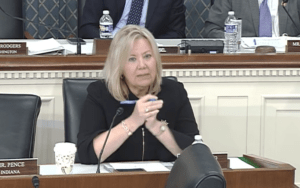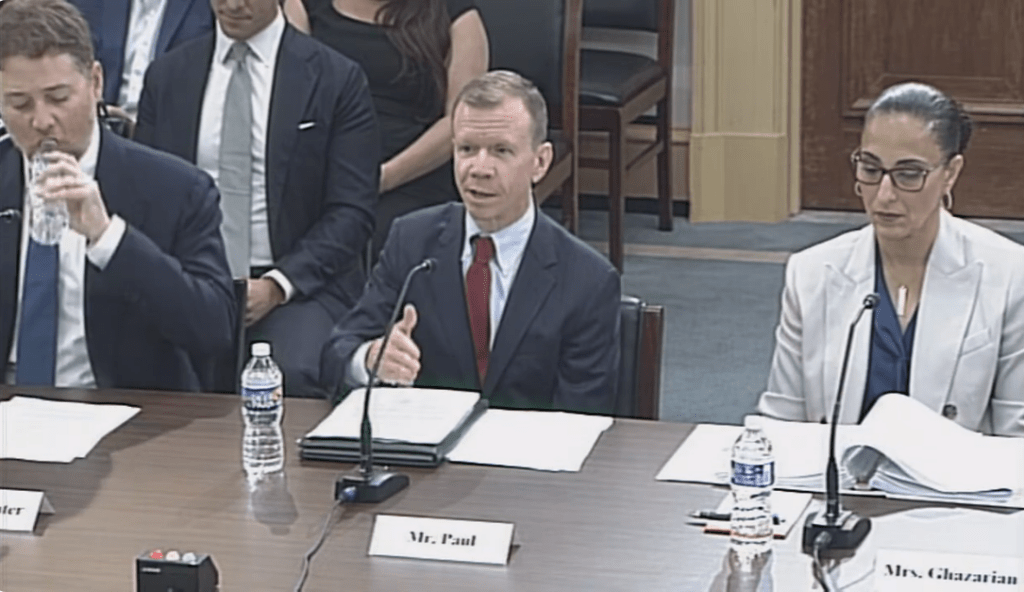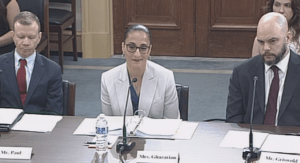Capitol Hill has no shortage of hearings about American businesses leaving China in order to diversify supply chains. Congress is full of members wanting businesses to leave there. But on Wednesday, Rep. Debbie Lesko (R-AZ-8) asked an American CEO of a small business the million-dollar question: is leaving China the same as leaving Chinese businesses? The answer might come as no surprise to CPA members.
During the Q&A period in a hearing titled “Mapping American Supply Chains to Beat China” by a House Energy & Commerce subcommittee, Lesko asked one of four witnesses if her recent exit off mainland China in favor of factories in Taiwan and Vietnam were still tied to the same supplier she left behind.
“I’m trying to get a handle on whether those companies are controlled by the Chinese government. Is this just a way Chinese companies found to get around tariffs?” she asked.
Deena Ghazarian, founder and CEO of Austere, makers of computer peripherals like power cords and USB ports, smiled in response as if being glad to be asked that question. “So both of the companies that we have shifted our production to other countries are still rooted in the leadership of the original manufacturing partner in China,” she said. Ghazarian was one of four-panel witnesses. [Testimony] “They shifted production for us to other facilities in other countries to be able to support us with the skill and quality we needed for our product.”
Ghazarian was not alone in saying labor costs here, coupled with workforce readiness were perennial headwinds to reshoring.
Rep. Lesko then trained her sites on witness Chris Griswold, policy director from the non-profit group called American Compass. “How can we reduce dependencies of certain raw materials and what are those raw materials?” she asked him.

Rep. Lesko asked whether businesses leaving China because of tariffs and other reasons were still working with the same Chinese company abroad.
Griswold said that despite some rare earths mining starting up in the United States, “those materials we extract have to be sent to China for processing and then sent back here. That is a huge vulnerability. China has restricted access to that market before and they can do it again. That is one instance of many of the dependencies we have.” [Testimony]
“This is such a problem,” Lesko said. “We had the Secretary of Energy in front of our committee and she said that she supports domestic mining but in Arizona they pulled back permitting for a big copper mine and we need that copper for electric cars. I don’t understand it. How are we going to reach these goals that the administration wants without doing any mining here?” she asked him. “Maybe someone someday will explain that to me. We have a heavy lift here in the United States.”
The hearing was organized by the Innovation, Data and Commerce Subcommittee.
Rep. Lisa Blunt Rochester (D-DE) kicked off the hearing with a nod to her Supply CHAINS Act, which she started working on in February. She said that supply chain matters require “a national strategy with measurable goals that include enhancing federal government support for the private sector if we are going to compete.”
In numerous hearings on Capitol Hill this year, it has become clear that the rules-based order of open markets and low cost are often viewed as having been detrimental to large swaths of the U.S., if not a national security risk.
The hearing was supposed to focus on four bills in the works, of which the Supply CHAINS Act was not part, but veered off into bigger picture concerns and case study examples during the question and answer period.
The best on-the-ground perspective from a goods manufacturing perspective came from Ghazarian.
Deena Ghazarian in the middle. She was one of four witnesses during a subcommittee hearing held by House Energy and Commerce on Sept. 20, 2023 to discuss supply chain resiliency.
“I’m an American company and if I could bring my business back here and allow me to make the quality products I would do it,” Ghazarian said. “It has been a very interesting learning experience over the last three years to remove yourself from a country that is very established as a manufacturing base. We could do it in Southeast Asia, which is a subnetwork to China. That allowed us to shift to production in Vietnam. We have done a lot of homework on Mexico. That would be the ideal place for me to near-shore production. It is quick, simple and competitive. It would allow me to bring things into the country two weeks after they are made rather than four weeks or more out of China. But the problem with Mexico is that I still need parts from all over the world in order to build my product, because Mexico doesn’t have the resources to make it. If Mexico had those resources, then small businesses like mine would shift to sourcing from there,” she said.
Rep. Cathy McMorris Rodgers (R-WA-5) asked why not consider making Austere’s products in the U.S.
“Because the labor cost is astronomical,” she said, then giving an example of one of her products – a cleaning spray used on tech goods like laptops. “I looked into this and if I sourced it here, it would double my cost, double my retail price and that would take me out of the market completely here.”
“We are in a manufacturing dilemma,” said Rep. Neal Dunn (R-FL-2). “China has flipped the concept of globalism on its head. I support bringing jobs back home. But I have to say, it’s not surprising that businesses all sought cheaper costs and went to China. Labor cost must be a big consideration.”
“It is a 1,000 percent consideration,” Ghazarian said, adding that tariffs were what made her move out of mainland China. The cost of labor alone completely takes the U.S. out of the market for my company. A lot of the work that my products need requires hands-on labor and that workforce does not exist here. I would have to take on that training cost and that would slow me down.”
Dunn said he was trying to get waivers on some tariffs, while at the same time saying he wanted more production here. He promoted the reauthorization of the Generalized System of Preferences. This trade policy, now in limbo since 2020, is designed to give duty free access to least developed countries for a few product items. Many poor countries in Southeast Asia would be GSP beneficiaries, meaning Chinese companies that have been outsourcing to those countries – or have set up shop themselves – would benefit from GSP.
See CPA Trade Counsel Charles Benoit’s GSP explainer here.
“China is 29% of the world’s global manufacturing output which tells me we need to bring some of that manufacturing to the United States,” Dunn said.
Scott Paul, president of the Alliance for American Manufacturing, was one of the four witnesses. [Testimony] “We have underinvested in our infrastructure and have undercapitalized manufacturing for three decades,” he said. “We are playing catch up now.”














